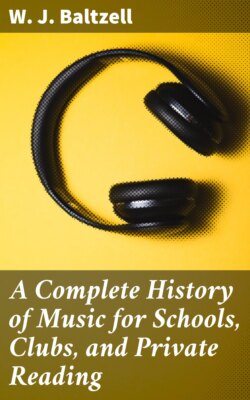Читать книгу A Complete History of Music for Schools, Clubs, and Private Reading - W. J. Baltzell - Страница 13
На сайте Литреса книга снята с продажи.
LESSON VII.
Music Outside the Church.
ОглавлениеTable of Contents
Up to this, our study of music in the Christian Era has traced the development of the art as fostered by the Christian Church, and mainly among the people of Southern Europe, in whom there was a strong admixture of the Latin blood and spirit. Before going farther on this line we will look into the record of music among the races of Northern Europe.
Music of the Gauls.—Roman writers give us some account of the character of the music of the Gauls, which differed much from the Greco-Latin songs. Roman historians make mention of the songs of the Gallic bards, who were poets and musicians as well, composing both religious hymns and songs in honor of their heroes. According to Diodorus of Sicily, the Gauls practiced the musical art long before the Christian Era, having regular schools for the instruction of the younger bards. The instrument used in accompanying their songs was a sort of lyre, judging from representations on some gold medals made in the time of Julius Cæsar. Charlemagne ordered a collection of the early Gallic songs to be made, but the work has not survived.
The Celtic Bards.—The Breton bards made use of an instrument the name of which is variously spelled Crouth, Crowd, Chrotta, Crwth, played with a bow, with an opening in the upper part through which the performer placed the left hand in order to press the strings, the number of which varied from three to six. The crouth of the Welsh bards differed in some respects from those that were made use of by the Breton bards. With them, however, a form of the harp became the national instrument. The early history of Celtic music in Wales in particular, is mingled with myth. We have only the names of bards, Fingal, Fergus and Ossian, no authentic music. What is of importance to us is the secular organization of the bards. One class included poets, historians and those skilled in the science of heraldry; another class comprehended musical bards, harp players bearing the title of doctors of music, players of the six stringed crouth and singers, who must have been skilled men, since nine years’ study was exacted of them.
